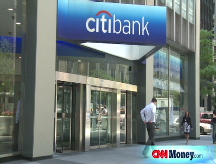Citigroup loses, but surprises Wall Street
Banking giant reports $2.5 billion loss, but results are not as bad as analysts had feared.
NEW YORK (CNNMoney.com) -- Citigroup booked a $2.5 billion quarterly loss Friday, but surprised investors as it took fewer painful marks against its books and stayed ahead of Wall Street's dreary earnings projections.
The company said it lost $2.5 billion, or 54 cents a share, for the second quarter. Just a year ago, the company reported a profit of $6.23 billion, or $1.24 per share.
Revenue fell 29% to $18.7 billion from $26.3 billion last year.
Analysts polled by Thomson Reuters were expecting the New York City-based bank to report a loss of $2.86 billion, or 66 cents a share, on revenue of $17.55 billion.
Investors cheered the news as Citigroup (C, Fortune 500) shares rose nearly 10% in Friday trading.
"I wish we owned it right now," said Timothy Ghriskey, chief investment officer at Solaris Asset Management, which oversees about $2 billion. "The quarter was better than expected, but in our view, fundamentally there are still issues out there not only with Citi, but with a lot of financials."
Vikram Pandit, Citigroup's recently installed chief executive, said in a statement that there was still much to do, but that he was encouraged by some of the progress the company made during the quarter - including taking fewer writedowns across its books.
During the quarter, Citi marked down its assets by $7.2 billion, nearly half of which was due to Citi's exposure to subprime mortgage-related investments. That was far less than some analysts on Wall Street were anticipating - some were expecting the company to mark down their assets by as much as $12 billion.
Since the credit crisis erupted last summer, Citigroup has taken nearly $40 billion in writedowns.
Amid further deterioration in the housing market, soaring energy costs, and rising unemployment, Citigroup said was it also hit by credit costs, which reached $7.2 billion during the quarter. That included a $2.5 billion charge to ramp up its loan loss reserves.
Those credit woes were clearly visible in Citi's consumer-related divisions including retail banking and its credit card business, which saw its profit plunge 56% from a year earlier.
Citigroup's chief financial officer Gary Crittenden warned during a conference call with analysts that loss rates in Citi's card division could exceed historical peaks.
"Credit obviously continues to be an issue," said Crittenden.
But other key businesses suffered as well, including its highly profitable wealth management division. Citigroup said the division's net income fell 21% from a year earlier. But the hardest hit was the company's institutional client group, which includes Citi's investment banking, fixed-income and prime brokerage, which services hedge fund clients. That division swung to a $2.04 billion loss after reporting a profit of $3.38 billion just a year ago.
Still, the banking giant took great steps to slim down its bloated balance sheet. During the quarter, Citigroup said it reduced its number of assets by $99 billion during the quarter - accomplishing part of that from the sale of some of its non-core businesses, including credit card issuer Diners Club International.
In May, Pandit unveiled a massive restructuring plan for Citigroup that would unload more than $400 billion in assets over the next few years as part of an effort to whip the New York-based bank into shape.
Citigroup also provided an update on its previously announced staffing cuts, noting it cut back its staff by 6,000 during the quarter, 1,900 of which came from the company's securities and banking division. Last quarter, the company announced plans to cut 9,000 jobs from across the firm during the coming year.
The latest numbers from Citigroup also put to rest fears that the company may have to raise additional capital in the coming months as it copes with more losses.
After issuing close to $13 billion in common and preferred stock over the last three months, Citigroup said its Tier 1 capital ratio, a key measure of a financial institution's ability to absorb losses, stood at 8.7%. A Tier 1 capital ratio of above 8% is generally considered a good sign for financial institutions.
Ongoing deterioration in the housing market, mounting troubles in the economy and pressure from regulators have prompted large financial institutions such as Citigroup to raise capital. That's come in the form of stock sales, dividend cuts and equity stake sales to outside investors. Crittenden said that there were no plans to cut its dividend any further.
Encouraging signs about Citigroup's capital levels prompted Deutsche Bank analyst Mike Mayo to upped his rating on the firm to "hold" from "sell" on the news.
"Concerns of an imminent capital shortfall have abated and should help Citi earn through additional positive write-downs," Mayo wrote in a note Friday.
But Friday's loss marked the third straight quarter that Citigroup has fallen into the red. In April, the company lost more than $5 billion due to troubles in its fixed-income business and higher consumer credit costs.
The results also cap what has been a mixed week of earnings news from the nation's largest financial firms.
Late Thursday, Merrill Lynch (MER, Fortune 500) booked its fourth straight quarterly loss. Merrill lost nearly $5 billion after taking just over $9.7 billion in writedowns.
Both JPMorgan Chase (JPM, Fortune 500) and Wells Fargo (WFC, Fortune 500) saw their profits plunge during the quarter, but still managed to stay ahead of Wall Street's expectations. That news helped drive their shares, as well as the rest of the battered financial sector, higher the past two days. ![]()




